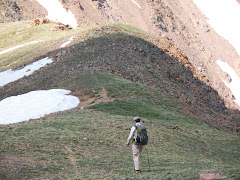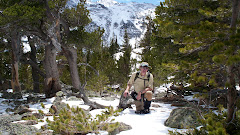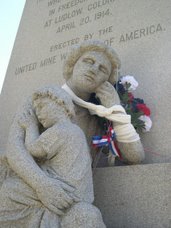

Prelude:
Stan Goff was the engine and the soul of the Walkin' to New Orleans action. He showed compassion, understanding and determination to get it done.
My favorite of many anecdotes I have about Stan during this march was in Biloxi. The cops of Biloxi tried their damnedest to harass us with threats of arrest if we didn't keep off the side of the road or keep walking. Some in the group were grumbling and angry.
Well, with a group of Iraq war vets mixed with a group of Vietnam war vets there is possibility of anger turning ugly. Stan knew this all too well.
So, Stan took the megaphone he had attached to his body throughout and spoke to us. He reminded us our purpose was "peace" and we should act with love and peace in our hearts. He also reminded us that many of the cops we were grumbling about lost everything when Katrina hit and worked under incredibly difficult stress.
Instead of demonizing the cops as our enemies, Stan made them humans like all of us. Stan demonstrated for all of us what peace should be.
I was proud to walk those roads and towns with Stan Goff. I'm overjoyed I got to see the joy in his face when we walked into Congo Square. I made damn sure I shook Stan's hand and hugged him before I left.
Stan deserves the respect and admiration of a nation for being the winter soldier who didn't leave his country in the lurch during difficult times but stepped up in true patriotic love of country.
Hell just read his remarks that follow and you'll get an idea of the type of man he is. To Stan, Namaste'...I honor you.
Peace and solidarity
Terry Leichner, RN
USMC combat infantryman
Vietnam - December 31, 1967 to February 12, 1969
co-founder Denver chapter Vietnam Veterans Against the War
“Walkin’ to New Orleans” ...in Summation
As I begin, I am exhausted. The tops of my ears are peeling from sunburn. Sitting here at this keyboard, one wonders if it was real. We just did something along the Gulf Coast with this march we spent the last two months coordinating, but I haven't had time to reflect enough on it to see the different facets of what just happened. I just know something did. I hope others who participated, will read this and post comments to say what they think happened, because I wasn't alone in thinking that something did.
We did not suddenly catalyze anything, but we also did not engage in some kind of action where each person's responsbility was just to show up to enlarge a protest, then go home. Something with a longer lifespan than than has taken an embryonic form, and it feels tangible even when I haven't had time to sort out exactly what it is. I already miss the people who were there.
We came to life each morning like a flower opening to the sun, steadily and gradually. Grumble's cowboy-coffee container was a gravitational field that drew us in like particles from the multilucent peaks and domes of our tent-towns. With the first hot sips, people holding their bodies tightly against the chill shared their little experiences with fire ants, cold, heat, or something dislocative they might have seen the day before, and healed each other with laughter.
Then there was food and the resumption of conversations from the day before. More laughter. Occasionally, some tears, whereupon one, two, even three people might embrace. When one of the Iraq vets shed a tear, six, seven, or eight would fold around him… or her… as if their combined hearbeats and heat would drive out sadness and distress.
And the walking. There is nothing that compares to walking, in my opinion, for stimulating the circuits in one's head; something about spinning the earth along under your feet like a log roller that creates a kind of muscular background music and the scenery that goes past becomes a spiritual setting. After a while, when the blisters and sore metatarsals and general fatigue take form, anything gradiose that might have contaminated one's consciousness is trimmed away with the knowledge that in the end, it all comes down to bodies — to the limitations of bodies, the capacities of bodies, the caring for bodies, the recognition of bodies.
In a large group like this, from 120 to 300, pick your day — it fluctuated — one talks while s/he walks, listens, collects and offers little scraps of acquaintence that accumulate into nascent friendships… contextualized by that body-knowledge, by the rhythm of walking, by the rolling of the earth under our feet in the same direction, and by the steady stream of change that flows past us.
Even when that scenery is of loss and disorder.
Especially when that scenery is of loss and disorder.
And there was dancing. We danced down the Gulf Coast. Ask anyone who was there. We danced in Prichard. We danced along the highway during breaks when the Iraq vets would pull out their drums. We danced in a relief worker camp and in a soccer field. We danced down the streets of Slidell to drums, a tuba, and a tenor sax. We danced in Congo Square. We swayed and clapped to the sounds of church choirs.
We laid flowers below old photographs of the dead. We juggled. We ate gumbo and peanut-butter-jelly sandwiches. We talked to people with cameras and camcorders.
At one point, we had fifty vehicles in tandem, with two buses up front that made the queue look like a train. Each vehicle had its emergency flashers on, and other people passing in atomized cars would gawk and wave and honk horns and flash two-finger peace sings. Traffic management and preparation to simply move became monstrously complex.
But even that "glitch" suddenly revelaed itself as strength. I hated directing that traffic, but when I looked back down the shoulder of the road one day, and all those cars were lined up, it was apparent that we were showing our strength. We were a train, a peace train, and we started taking towns by simply moving in… cops were stunned and baffled, struggling to retain some semblence of control and authority, and we let them have it.
Did you get that? We LET them have it. Where was the power then, eh?
Every glitch, every last minute change, every late decision to follow some suggestion from a marcher, or a local survivor became something surprising and wonderful. We knoew where we wanted to begin and end, but the route was pure jazz… improvisation, with every marcher playing her or his part.
I haven't sorted this out yet, but I will say this as I prepare to close and rest. We scared people. We publicized this event in ways that caused people to decide NOT to come. We warned about contamination, about austerity and physical effort, about weather and insects, and we said it would last for six days.
So those that came were young and old and everything in between, and black and white and everything in between, and rural and urban and everything in between, and northern and southern and everything in between, and even male and female identified along multiple continua. But there was a common demographic… a personality demographic, or maybe a character demographic, held in common.
Everyone who came was willing to try something none of us completely understood. Everyone who came was willing to drop everything to do something they sensed might be important. Everyone who came was willing to accept risk. And everyone who came was willing to accept responsibility.
That's what none of us who organized this could see clearly until it happened, because the phenomenon we just experienced was a collective dynamic that was the qualitative offspring of the quantity of people who have this common character.
I don't know what we just did… except to put a couple hundred people outside their familiar surroundings, onto the margins of the grid, and move them cross country like a mechanized battalion through this incredibly strategic place.
I know this. We are not done yet.
Stan Goff
Veteran For Peace, Mitary Families Speak Out













No comments:
Post a Comment